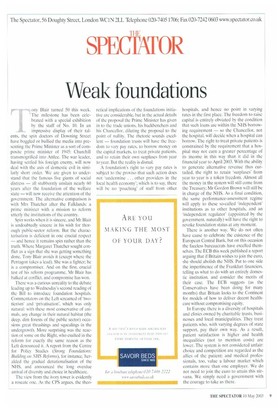Weak foundations
ony Blair turned 50 this week. The milestone has been celebrated with a special exhibition by the staff of No. 10. In an impressive display of their tal ents, the spin doctors of Downing Street have boggled or bullied the media into presenting the Prime Minister as a sort of composite prime minister of 1945: Churchill transmogrified into Attlee. The war leader, having settled his foreign enemy, will now deal with the axis of domestic evil in similarly short order. We are given to understand that the famous five giants of social distress — all stubbornly unslain nearly 60 years after the foundation of the welfare state — will now receive the attention of the government. The alternative comparison is with Mrs Thatcher after the Falklands: a prime minister with a mission to reform utterly the institutions of the country.
Spin works when it is sincere, and Mr Blair is undoubtedly sincere in his wish for thorough public-sector reform. But the characterisation is deficient in one crucial respect — and hence it remains spin rather than the truth. Where Margaret Thatcher sought conflict as a sign that she was getting something done, Tony Blair avoids it (except where the Pentagon takes a lead). She was a fighter; he is a compromiser. And on the first, crucial test of his reform programme, Mr Blair has balked at conflict, and compromise has won.
There was a curious unreality to the debate leading up to Wednesday's second reading of the Bill to introduce foundation hospitals. Commentators on the Left screamed of 'twotierism' and 'privatisation', which was only natural: with these most conservative of animals, any change in their natural habitat (the deep, dim forests of the public sector) occasions great thrashings and squealings in the undergrowth. More surprising was the reaction of some on the Right, who exulted in the reform for exactly the same reason as the Left denounced it. A report from the Centre for Policy Studies (Sttvng Foundations: Building on NHS Reforms), for instance, heralded the gradual denationalisation of the NHS, and announced the long overdue arrival of diversity and choice in healthcare.
The view from the ivory tower is evidently a roseate one. As the CPS argues, the then
retical implications of the foundations initiative are considerable, but in the actual details of the proposal the Prime Minister has given in to the trade unions, his backbenchers and his Chancellor, diluting the proposal to the point of nullity. The rhetoric sounds excellent — foundation trusts will have the freedom to vary pay rates, to borrow money on the capital markets, to treat private patients, and to retain their own surpluses from year to year. But the reality is dismal.
A foundation's right to vary pay rates is subject to the proviso that such action does not 'undermine . other providers in the local health economy"; which is to say, there will be no 'poaching' of staff from other hospitals, and hence no point in varying rates in the first place. The freedom to raise capital is entirely obviated by the condition that such loans are within the NHS borrowing requirement — so the Chancellor, not the hospital, will decide when a hospital can borrow. The right to treat private patients is constrained by the requirement that a hospital may not earn a greater percentage of its income in this way than it did in the financial year to April 2003. With the ability to generate alternative revenue thus curtailed, the right to retain 'surpluses' from year to year is a token freedom, Almost all the money in the system will still come from the Treasury; Mr Gordon Brown will still be in charge of the NHS. As a final condition, the same performance-assessment regime will apply to these so-called 'independent' institutions as to other hospitals, and an 'independent regulator' (appointed by the government, naturally) will have the right to revoke foundation status at any moment.
There is another way. We do not often have cause to celebrate the existence of the European Central Bank, but on this occasion the faceless bureaucrats have excelled themselves. The ECB this week published a report arguing that if Britain wishes to join the euro, she should abolish the NHS. Put to one side the impertinence of the Frankfurt financiers, telling us what to do with an entirely domestic institution, and consider the merits of their ease. The ECB suggests (as the Conservatives have been doing for many months) that Britain looks to the Continent for models of how to deliver decent healthcare without compromising equity.
In Europe there is a diversity of hospitals and clinics owned by charitable trusts, businesses and local municipalities. They treat patients who, with varying degrees of state support, pay their own way. As a result, patient satisfaction is higher and health inequalities (not to mention costs) are lower. The system is not considered unfair: choice and competition are regarded as the allies of the patient; and medical professionals, too, value a labour market which contains more than one employer. We do not need to join the euro to attain this nirvana. We simply need a government with the courage to take us there.


































































 Previous page
Previous page